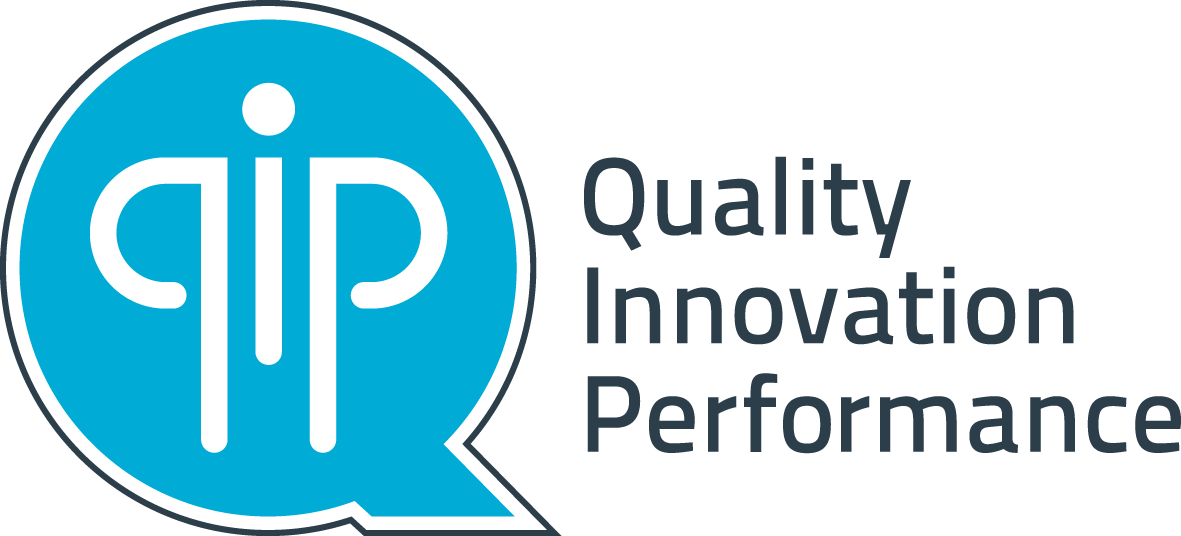Latest news
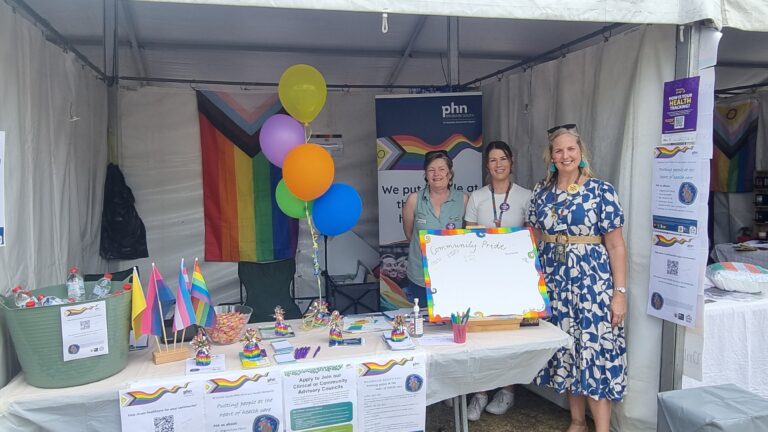
Leading with pride: How Brisbane South PHN is embedding inclusion across the healthcare system
What does it take to create a health system where every person feels safe, welcome and respected? For Brisbane South PHN (the PHN), the Rainbow Tick accreditation process provided an opportunity to build stronger systems, empower staff, and enhance the organisation’s ability to support LGBTIQA+ communities with care and intention.
Brisbane South PHN is one of only two Primary Health Networks (PHNs) in Australia to achieve Rainbow Tick accreditation. The team welcomed the opportunity to lead by example and demonstrate that organisations of all types, including those that do not deliver direct clinical care, have an important role in building inclusive and culturally safe health systems.
Brisbane South PHN works in partnership with primary care providers and health system partners to reduce gaps in opportunity, health outcomes, and life expectancy. The organisation focuses on supporting communities that experience the greatest inequities. Through its programs, partnerships, and internal culture, the PHN actively supports LGBTIQA+ people, Aboriginal and Torres Strait Islander communities, Multicultural/Refugee communities, people with disability and other priority groups.
The team’s commitment to inclusive care has been formally recognised through Rainbow Tick accreditation with QIP. This national framework includes assessment against six core standards that reflect safe and inclusive practice across areas such as organisational governance, workforce development, welcoming environments, and culturally safe services.
Brisbane South PHN approached the accreditation process as an opportunity to uplift its workplace culture, strengthen staff capability, and deliver affirming, person-centred support to its team, partners, and community. With strong internal foundations now in place, the organisation is also looking ahead to how it can extend this inclusive approach across the broader health system through its commissioning and partnerships.
This case study highlights a values-driven approach to continuous improvement and shares lessons that can inform and inspire other organisations.
We spoke with Susan Lingard, Health Access and Equity Senior Program Development Coordinator to learn more about their PHN’s journey and the broader impact of inclusive practice on staff, stakeholders and community wellbeing.
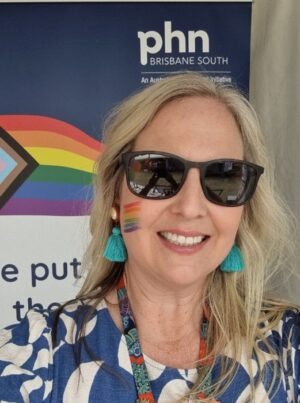
Susan Lingard, Brisbane Pride Fair Day, Musgrave Park – Sept 2023
Leadership and vision for inclusive care
For Brisbane South PHN, pursuing this accreditation was a natural progression of its core values and strategic vision for health equity. “Brisbane South PHN values an inclusive culture that embraces the diversity of our people, service providers and community, and role models reconciliation. Building a safe and equitable system of health care for all is at the core of our business,” explains Susan Lingard, Health Access and Equity Senior Program Development Coordinator at Brisbane South PHN. This aligns with Brisbane South PHN’s 2024–27 Strategic Plan, which lists LGBTIQA+ communities as a key priority group and outlines specific goals to enhance health equity and culturally safe care.
Strong leadership and the organisation’s Board drove the decision to undertake the Rainbow Tick accreditation journey, which aligned with Brisbane South PHN’s integrity and diversity values, offering a tangible framework to demonstrate that inclusive practices are more than just encouraged but formally recognised and supported across all levels of the organisation. In July 2023, Brisbane South PHN officially achieved full Rainbow Tick accreditation for a three-year period, becoming the second Primary Health Network in Australia to do so. This made a clear public statement that the organisation is committed to being a safe, inclusive and affirming environment for LGBTIQA+ people in its own workforce and throughout the communities it serves.
Preparing for the Rainbow Tick assessment
For Brisbane South PHN, going through the accreditation process required careful planning and organisation-wide engagement. The organisation began by appointing a dedicated lead to manage the Rainbow Tick accreditation journey and establishing a working group of representatives from across the organisation. Over an eight-month preparation period, the team coordinated a thorough self-assessment and a three-year quality improvement (QI) plan. This long-term roadmap has been a cornerstone of their Rainbow Tick journey, providing structure, accountability, and a clear vision for ongoing progress. The QI plan continues to guide the organisation’s actions well beyond accreditation, ensuring that inclusion is approached as a continuous process, rather than simply a one-time achievement.
Throughout this preparation phase, all levels of the organisation got involved, from staff to executive leaders and Board members, who took part in surveys, training sessions, education workshops, and inclusive practice activities. As Susan explains, “A key focus was to ensure that we were all speaking the same language, that there was a deep recognition of the importance of inclusivity and diversity within the organisation and the benefits this brings.” These activities fostered a shared understanding and purpose, reinforcing that the work was a meaningful commitment to creating lasting change. “Processes were to be embedded within our normal business ways of working,” Susan adds. At Brisbane South PHN, Rainbow Tick was approached as a long-term quality improvement journey.
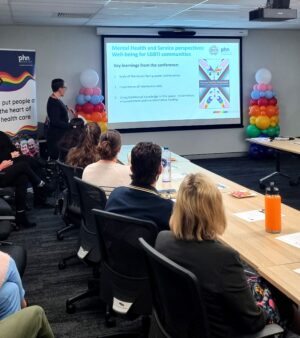
Pride Month lunch and learn for Brisbane South PHN staff – June 2024
Embedding inclusion in workplace culture and systems
As part of the accreditation process, the organisation implemented a range of internal changes to create a truly inclusive workplace culture. These initiatives addressed several areas, from physical environment to policies and ongoing staff development.
Visible signs were placed to create a welcoming environment through displaying rainbow flags as well as having ‘You Are Welcome’ stickers placed in office entrances. Staff were also encouraged to wear pronoun badges and pride pins on their lanyards. These small inclusions signal to both staff and visitors that diversity is embraced and everyone is respected. Regarding these visible signs, Susan mentioned that she was approached by a new staff member who told her that “When they came for an interview and saw the ‘You are welcome here’ stickers on our front door and Rainbow Flags in reception, they felt comfortable and were looking forward to working here.”
Further initiatives included staff education by introducing mandatory LGBTIQA+ inclusivity training for both new and existing staff, as well as creating an annual workplace inclusion survey to understand the current workplace climate and identify any ongoing learning needs. Actively celebrating visibility has also become part of everyday activities at Brisbane South PHN. Staff participate in and celebrate important dates such as those during Pride Month, allowing them to connect with community members and other local organisations to reinforce a sense of allyship in the workplace culture.
A key internal focus was strengthening organisational policies to support inclusion. This included developing a ‘Gender Affirmation in the Workplace Policy and Guide’, as well as an ‘Equity in the Workplace Policy’. Existing anti-harassment policies were also updated to explicitly address bullying, sexual harassment, and sex and gender-based harassment, with staff training rolled out to support implementation.
Brisbane South PHN also worked with Metro South Health in the development of two new health pathways for GPs including Adult Trans Health and Gender-Affirming Hormone Therapy.
Brisbane South PHN also demonstrated commitment to LGBTIQA+ inclusive practices by the creation of a new role exclusively dedicated to inclusion, establishing a permanent Health Access and Equity Senior Program Development Coordinator position. This position, filled by Susan, oversees Rainbow Tick implementation and LGBTIQA+ initiatives on an ongoing basis. By resourcing a specific role to drive these actions, Brisbane South PHN demonstrates that inclusion is not a one-off project, but an integral, sustained priority.
These changes were further reinforced by the organisation’s ongoing QI planning, which includes feedback from assessors as part of their accreditation assessment, specific milestones, and staff input to ensure efforts continue to evolve and improve.
All these initiatives and efforts are viewed by the organisation as more than a requirement to meet accreditation, but as an investment for the future, helping provide better care for their communities. As Susan reflects, “Investing in Rainbow Tick and inclusion isn’t just about compliance — it builds a stronger, more respectful, and skilled workforce that can adapt to the real needs of our communities.”
Fostering community trust and sector-wide change
Achieving Rainbow Tick accreditation has positioned the Brisbane South PHN as a trusted partner and leader for inclusive healthcare in the wider community and among partner organisations. “Achieving Rainbow Tick was an important first step in demonstrating our commitment to providing a safe, affirming and inclusive environment,” Susan notes, “It helps us to build trust with community members, signals to staff and partners that inclusion is a priority and provides a clear framework for ongoing quality improvement.”
Brisbane South PHN’s efforts towards creating inclusive health equity have been noticed by other organisations. Since being listed on the Quality Innovation Performance (QIP) website as a Rainbow Tick accredited organisation, they have received attention from external service providers and health organisations seeking advice on their own inclusion initiatives.
Recognising the broader need for shared learning, they set up a National PHN Rainbow Tick Communities of Practice Working Group, to bring together peers from PHNs across Australia. Initially formed with support from Western Australia Primary Health Alliance (WAPHA) to exchange tips and recommendations during Brisbane South PHN’s accreditation process, this community has grown to include representatives from nine different PHNs. The group now meets regularly to share insights, challenges, and resources around LGBTIQA+ inclusive practices and accreditation, fostering sector-wide change in the healthcare industry. As a result, at least three other PHNs are now working towards achieving Rainbow Tick accreditation, inspired and guided by the collective knowledge of the group.

Brisbane Pride Fair Day 2023 – This community artwork is displayed at the Brisbane South PHN office
Supporting LGBTIQA+ youth through commissioned services
One of the most meaningful milestones for Susan and her team has been the commissioning of Open Doors Youth Service Inc servicing the Logan region. As Susan explains, “this service fills a vital gap in the region by supporting LGBTIQA+ Sistergirl and Brotherboy (SB) young people to live with pride as valued, celebrated, and authentic members of the community.”
Open Doors engages a workforce with lived experience, provides safe spaces for peer connection, and fosters belonging, while also advocating for the rights of young people. Its goals include reducing discrimination, improving mental health outcomes, and lowering rates of suicidality among LGBTIQA+ youth.
Importantly, Brisbane South PHN’s ability to support this kind of service delivery is underpinned by the strengthened internal systems, inclusive culture, and accountability frameworks developed through their Rainbow Tick accreditation journey. Brisbane South PHN is proud to support a service that addresses such pressing local needs and continues to lead by example in inclusive commissioning.
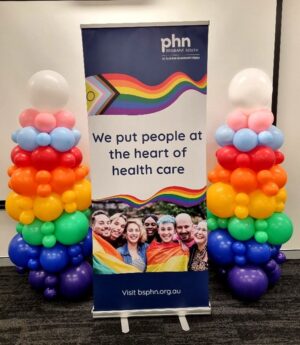
Lessons learnt
Brisbane South PHN’s Rainbow Tick accreditation journey has helped them gain valuable insights that could benefit other organisations seeking to become more inclusive.
An obstacle they faced throughout the accreditation process was that the Rainbow Tick framework has primarily been developed for frontline health and community service providers. As a Primary Health Network, they had to carefully interpret and adapt their process. WAPHA, as the first PHN to achieve Rainbow Tick accreditation, offered valuable advice throughout the journey, particularly on creating a strong QI plan and interpreting the Standards for an organisation that commissions services, rather than delivers them directly. This guidance was instrumental in helping Brisbane South PHN navigate the language and assumptions embedded in the Standards, such as references to ‘clients’ or ‘consumers’, which didn’t always align with their commissioning-based model.
After overcoming this challenge, the team approached their accreditation journey with strong commitment, taking the time to thoughtfully interpret and adapt the language to fit their unique context. Through care, passion, and determination, they successfully demonstrated that Rainbow Tick accreditation is not only achievable, but meaningful, even outside of traditional service settings.
Another key takeaway, shared by Susan, is the importance of having dedicated people in the organisation to drive any inclusion initiative. “If your organisation intends to become accredited, we highly recommend a dedicated lead person to manage it and the creation of a working group with representatives from across the organisation to support the planning, development and implementation,” she advises. Her experience showed that having a cross-functional team to champion these initiatives was critical to maintaining momentum over the many months of accreditation preparation.
According to the team at Brisbane South PHN, one of the most important elements to successfully embed inclusivity is genuine commitment at all levels. It was essential for them to treat the accreditation as a continuous improvement process, with leadership accountability and long-term goals. Susan also advises other PHNs or organisations (big or small) to set out clear actions and milestones, and to be prepared to demonstrate real progress. She says that “assessors want to see commitment and accountability.” This extends beyond the accreditation moment to demonstrating a clear and sustained plan for ongoing improvement. Brisbane South PHN’s three-year QI plan played a central role in meeting this expectation, providing a structured pathway to build on changes and continue embedding inclusive practice. The team also incorporated feedback from assessors into their QI planning, and continues to roll out training, monitor progress via workplace surveys, and schedule new inclusion initiatives as part of regular business planning. These actions ensure inclusive practice is embedded into everyday operations while remaining a long-term organisational priority.
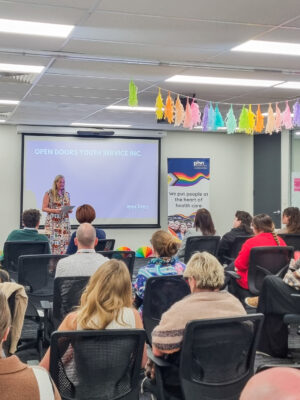
Susan Lingard, welcoming staff to the 2025 Pride Month lunch and learn
Future directions
Looking ahead, Brisbane South PHN is committed to building on the strong internal foundations established through this accreditation process. By prioritising internal systems, policies, and staff capability first, they have created a robust platform to more effectively support others, including general practices and service providers within their commissioning network. The goal is to help improve LGBTIQA+ safety and inclusivity throughout the broader health system.
As Susan explains, “We know from national data and local health needs assessments that LGBTIQA+ people experience higher rates of discrimination, harassment, and barriers to accessing care.” She strongly believes that having an inclusive approach ultimately benefits everyone: “It enhances our organisational capability, when we make our services and workplaces safer for LGBTIQA+ people, we improve care and outcomes for all.”
The team continues to prioritise staff training and professional development, recognising that inclusion is a journey, not a destination. They have more to achieve and remain committed to continuous improvement.
To support transparency and knowledge sharing, Brisbane South PHN recently launched a new LGBTIQA+ Health webpage. This platform offers a central hub where others can learn from their journey, explore inclusive practice examples, and access commissioning and clinical resources.
Brisbane South PHN’s ongoing commitment to inclusion reflects a deeper organisational vision, one where equity is embedded, communities are respected, and every person can feel safe and affirmed when seeking care. With strong foundations in place, they are well positioned to lead by example and continue to advocate for lasting change across the health system.
To learn more about Brisbane South PHN or to speak directly with Susan and her team about their Rainbow Tick journey, visit https://bsphn.org.au/
